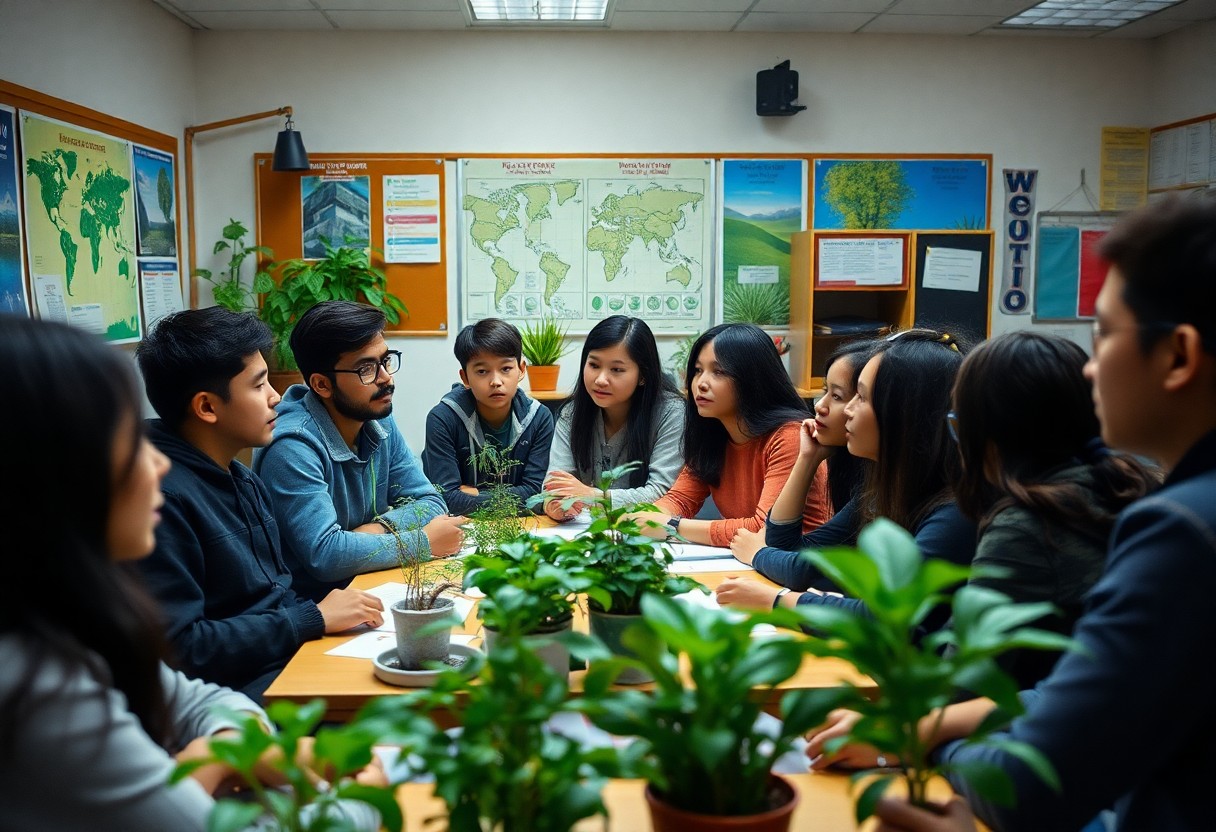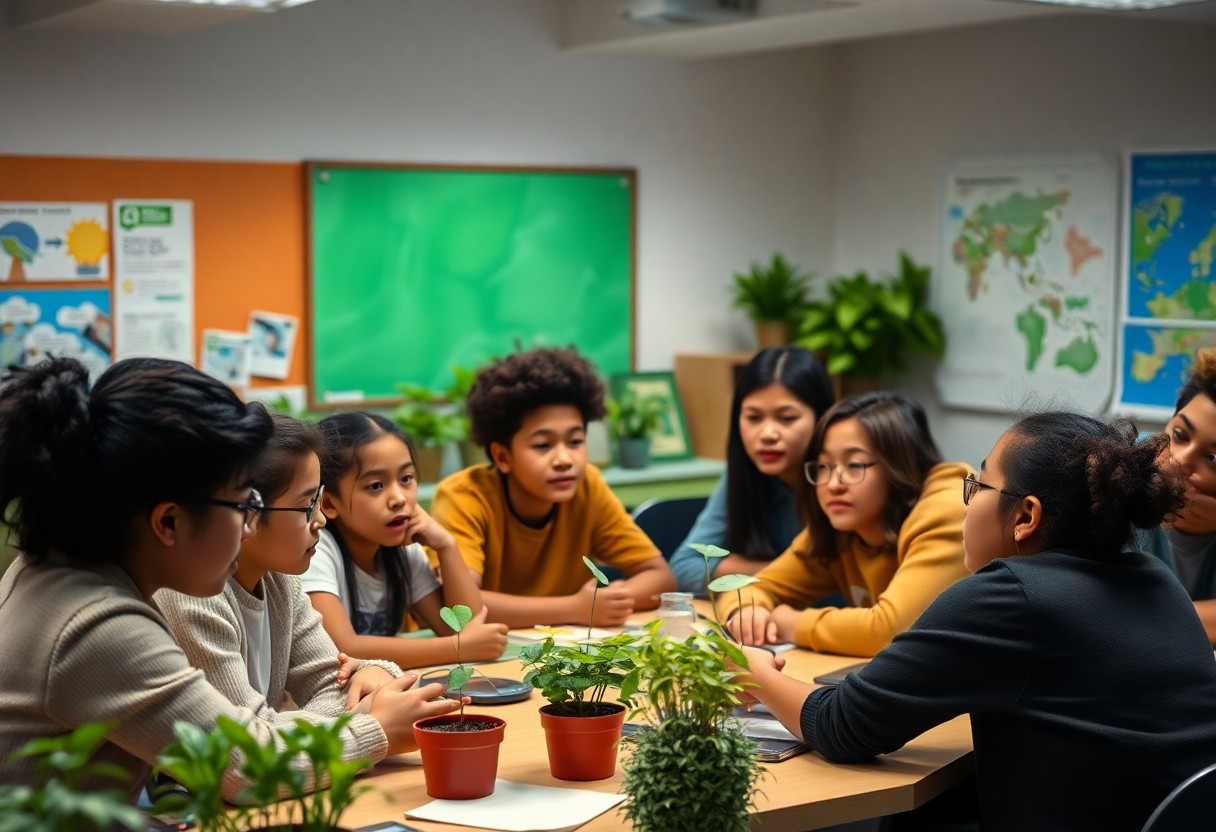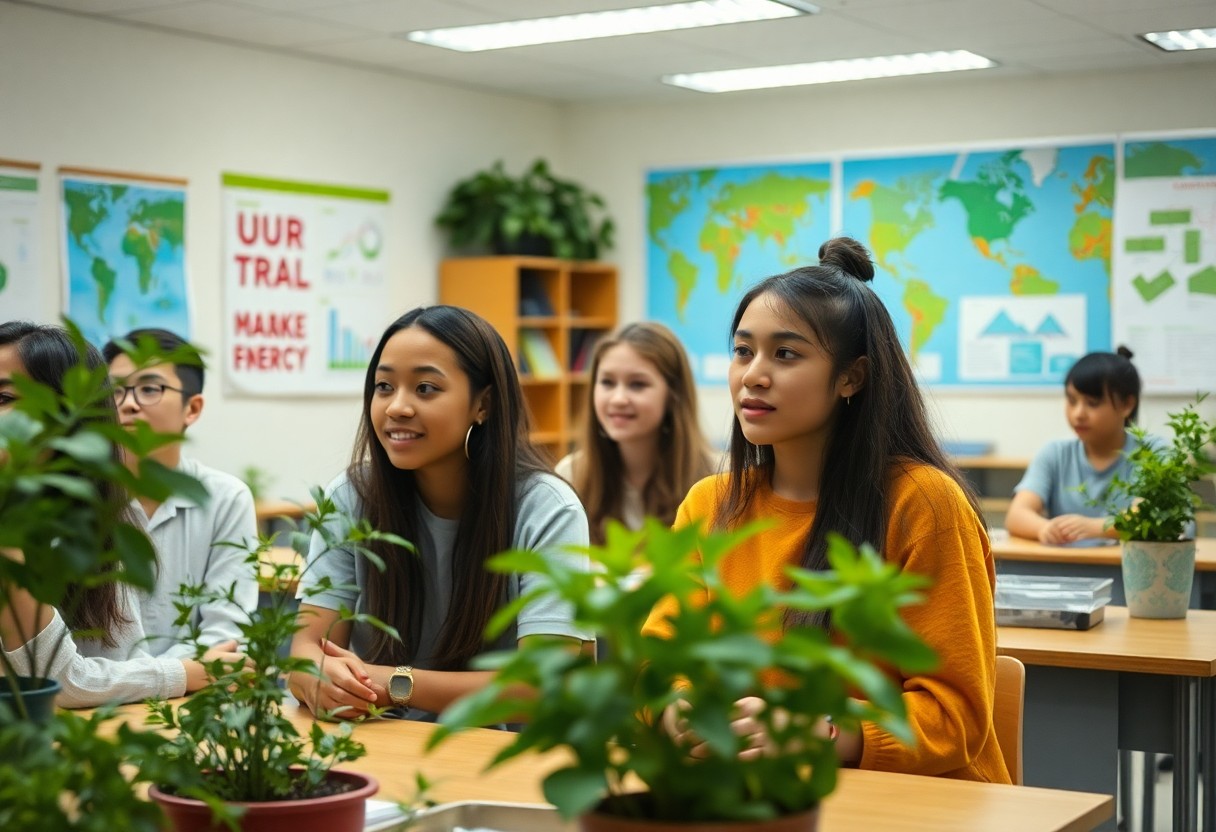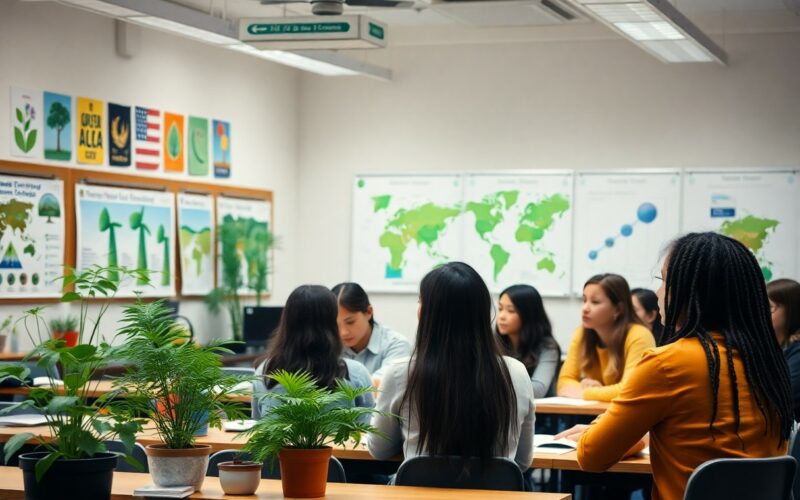It’s imperative for you to understand the vital relationship between education and sustainability. The knowledge you gain can empower you to not only recognize the environmental challenges we face but also foster a sense of responsibility towards our planet. By integrating sustainability into your learning experience, you can cultivate environmental awareness, inspire others, and contribute to positive change. This blog post will examine into how education can be a powerful tool in building a more sustainable future for everyone.

Table of Contents
Key Takeaways:
- Education fosters a deep understanding of environmental issues, equipping individuals with the knowledge to make informed decisions about sustainability.
- Integrating sustainability into curricula at all levels encourages students to develop critical thinking skills and engage in problem-solving activities related to environmental challenges.
- Experiential learning opportunities, such as community projects or outdoor education, enhance awareness and promote responsible environmental behaviors among learners.
- Collaboration between educational institutions, local governments, and organizations enhances the effectiveness of sustainability initiatives and expands outreach efforts.
- Awareness campaigns and programs in educational settings can inspire collective action, motivating individuals and communities to adopt sustainable practices.
Understanding Sustainability
Definition of Sustainability
The term sustainability has become a cornerstone in discussions surrounding environmental health and responsible living. Between ecological preservation, social equity, and economic viability, sustainability encompasses the ability to meet your current needs without compromising the well-being of future generations. It is about striking a balance and recognizing that the world’s resources are finite; thus, conscientious choices must be made by individuals and communities alike to ensure a thriving planet for all forms of life.
In your daily life, understanding sustainability means recognizing that every action you take has a ripple effect on the environment. Whether it’s the food you choose, the products you buy, or the energy you consume, these decisions impact the ecological balance and the health of your community. By fostering sustainable practices, you play an necessary role in promoting a resilient future.
The Importance of Sustainable Development
To grasp the significance of sustainable development, consider its potential impact on global challenges such as climate change, resource depletion, and social inequality. By integrating sustainable practices into your lifestyle, you contribute to a holistic approach that seeks to address the intertwined issues of environmental degradation and social justice. Sustainable development aligns economic growth with the conservation of natural resources, ultimately enhancing your quality of life while fostering a stable planet for generations to come.
At its core, sustainable development emphasizes the need for systems that are both environmentally sound and socially equitable—representing a paradigm shift in how we think about growth and progress. By adopting sustainable principles in your community, you help ensure a future where all individuals have the opportunity to thrive, benefitting both people and the planet.
Key Principles of Sustainability
Definition of sustainability includes various core principles that guide your understanding and application of sustainable practices. These principles encompass the need to respect the limits of natural ecosystems, promote social equity, and ensure economic viability. By integrating these key ideas into your actions, you can contribute to a more sustainable world that conserves resources and respects biodiversity.
Furthermore, as you explore these principles, you will find that sustainability is not a stationary goal; it requires constant adaptation and commitment. Active participation in sustainability efforts encourages the development of innovative solutions and fosters a deeper connection to your community and the environment.
Sustainability principles encourage you to think critically about the consequences of your daily choices. For example, by prioritizing renewable energy sources, reducing waste, and supporting local economies, you directly contribute to a healthier planet and a more equitable society. Engaging with these principles allows you to see how your individual actions can lead to significant positive change.
The Interconnection Between Education and Sustainability
Now, you may wonder how education intersects with sustainability. It plays a vital role in shaping your understanding of environmental issues and the actions you can take to address them. Education equips you with the knowledge needed to make informed decisions and encourages a proactive approach to the challenges posed by climate change, resource depletion, and biodiversity loss. By integrating sustainability into your educational journey, you become an active participant in the transition to a more sustainable future, fostering a culture of environmental responsibility not only in yourself but also in your community.
Education as a Tool for Change
Tool for change, education allows you to cultivate an awareness of your environmental impacts and empowers you to adopt sustainable practices. It creates an opportunity for critical thinking, whereby you can analyze different perspectives on sustainability and contribute innovative solutions to pressing environmental issues. By engaging with topics such as renewable energy, sustainable agriculture, and conservation efforts, you can develop a skill set that will benefit both your personal growth and the well-being of our planet.
Additionally, education can challenge the status quo and inspire collective action. When you learn about the significance of sustainability, you’re not just absorbing facts; you’re igniting a passion that can motivate others to join in making a difference. Participating in educational programs focused on sustainability can provide you with hands-on experiences that further enhance your commitment to protecting the environment.
Historical Perspectives on Education for Sustainability
The evolution of education for sustainability has significantly shaped the way you perceive your role in environmental stewardship. Historically, educational efforts aimed at raising awareness about conservation began in the early 1970s, reflecting growing concerns about pollution and resource depletion. Various movements and global conferences, such as the United Nations Conference on Environment and Development in 1992, emphasized the importance of integrating sustainability into education systems worldwide. You can trace how these initiatives gradually led to the development of formal curricula, which now encompass principles of sustainable development, climate literacy, and social equity.
It is crucial to recognize the transformative potential of educational advancements in this realm. The historical journey of sustainability in education illustrates a shift from traditional methods towards more inclusive, interdisciplinary approaches that consider environmental, economic, and social dimensions. As a result, you can appreciate how education has evolved from mere knowledge transmission to fostering critical awareness and active participation in sustainability practices.
Global Initiatives in Sustainable Education
Along your educational journey, you’ll come across various global initiatives that promote sustainable education. These initiatives aim to bridge the gap between environmental challenges and educational responses. Organizations such as the United Nations Educational, Scientific and Cultural Organization (UNESCO) have launched programs that encourage educational institutions to adopt sustainable practices. This creates a ripple effect, as students who are taught these principles will be more motivated to implement them in real-world scenarios. As you engage with these initiatives, you’ll find opportunities to participate in community projects and collaborative efforts that further enhance your learning experience.
Sustainability is at the core of many educational reforms worldwide, focusing on creating a generation that prioritizes environmental consciousness. You are encouraged to take part in these global movements, which highlight the importance of cultivating a sustainable mindset through active learning and community engagement. Embracing these initiatives equips you with the understanding and skills necessary to drive change in your local context, making lasting impacts on both your immediate environment and the planet as a whole.

The Role of Formal Education
Once again, formal education plays a pivotal role in fostering sustainability and enhancing environmental awareness among future generations. By integrating sustainability concepts into educational curricula, you can equip students with the knowledge and skills necessary to engage in sustainable practices. The international role of education in sustainable lifestyles emphasizes the importance of this instructional approach globally.
Curriculum Design for Sustainability
Above all, effective curriculum design for sustainability is crucial in shaping how students perceive environmental issues. You can incorporate interdisciplinary lessons that connect science, social studies, and economics to foster a holistic understanding of sustainability. Furthermore, hands-on projects and real-world applications within the curriculum allow you to engage learners in meaningful environmental discussions, enhancing their problem-solving skills and practical knowledge.
This educational design should also continually adapt to include emerging sustainability topics. By integrating the latest research and technological advancements into your lessons, you can ensure that students are well-informed and prepared to tackle environmental challenges. The incorporation of case-specific learnings, both historically and current, can also inspire students to take positive action in their communities.
Case Studies of Successful Programs
Successful educational programs that emphasize sustainability demonstrate effective models for you to explore. Often, these programs provide concrete examples of integrating sustainability into various educational settings. Evaluating their impacts can guide your approach to implementing similar strategies in your own context.
- Green Schools Initiative: Over 7,000 schools across the U.S. promoting energy efficiency led to an estimated decrease of 20% in overall energy use.
- Eco-Schools Program: Engaged 250,000 students in 64 countries, significantly increasing their participation in recycling and energy conservation activities.
- Youth for Sustainable Development: A program in South Africa that trained 5,000 students in sustainable agricultural practices, resulting in a 30% increase in local crop yields.
- UNESCO’s Education for Sustainable Development: Implemented in over 70 countries, positively impacting over 15 million learners through an integrated curriculum focused on sustainability.
Understanding various educational frameworks that emphasize sustainability allows you to recognize effective practices. By analyzing these case studies, you can glean insights that will influence your curriculum and program implementations.
Teacher Training and Professional Development
Any effective sustainability curriculum requires dedicated educators who are thoroughly trained in sustainability principles and teaching methods. Providing professional development opportunities that focus specifically on sustainability enables you, as an educator, to stay informed about the latest trends and advancements in this field. Participating in workshops, conferences, and collaborative learning experiences will expand your capability to deliver impactful instruction.
It is also vital to foster a community of practice among teachers who focus on sustainability. This collaborative environment encourages the sharing of resources and ideas, ultimately enhancing the effectiveness of your teaching approach. Connecting with fellow educators can help you stay motivated and innovative in employing sustainability-focused lessons that resonate with students.
Indeed, prioritizing teacher training ensures that the next generation is equipped with the tools to address pressing environmental challenges. Offering robust professional development tailored to sustainability allows you to cultivate an informed and passionate group of educators who can inspire their students to become environmentally conscious citizens.
The Role of Informal Education
Many avenues of informal education contribute significantly to fostering sustainability and environmental awareness. You may not realize that learning doesn’t only take place in traditional classrooms. Informal education encompasses various experiences, including workshops, community activities, and online resources that encourage proactive participation and learning about sustainability practices. Engaging in these informal settings can lead to intimate connections with the environment and provide a platform for you to explore environmental issues outside of the conventional educational framework. A comprehensive look at Education’s role in fostering environmental awareness and … helps to highlight the effectiveness of such non-traditional educational methods.
Non-Formal Education Approaches
Behind the scenes, non-formal education approaches create dynamic opportunities for learning about sustainability and the environment. Courses offered by community organizations, environmental clubs, or online platforms allow you to explore into specific topics at your own pace and with flexible attendance. These educational initiatives often foster creativity and critical thinking, empowering you to innovate and devise solutions for local environmental challenges. As a result, you can participate actively in the discourse surrounding environmental sustainability.
Additionally, these non-formal environments encourage collaboration and dialogue with peers, which can enrich your understanding of various perspectives on sustainability. They often invite experts in the field to facilitate discussions, sharing valuable insights that bolster your comprehension and igniting your motivation to engage more deeply with environmental issues.
Community-Based Sustainability Education
Below the surface of formal teaching lies a wealth of community-based sustainability education that fosters connection and collective action. Such education focuses on empowering local communities through hands-on experiences, where you can learn about sustainable practices tailored to your unique ecological and cultural context. This participatory approach nurtures your relationships with fellow community members and offers practical knowledge that can be directly applied to improve local environmental conditions.
Role in your community cannot be understated; community-based education often leads to enhanced community resilience and the capacity for collective action. Solving local environmental issues together cultivates strong social bonds and motivates you and your neighbors to take ownership of your environment, creating tangible changes in behavior and attitudes towards sustainability.
The Impact of Media and Technology on Awareness
At times, the way information is disseminated through media and technology plays a significant role in shaping your understanding of environmental issues. With a variety of platforms available, you have access to documentaries, podcasts, and social media campaigns, all designed to raise awareness of sustainability topics. These forms of media can provide rich, diverse content that bridges gaps in traditional education and brings critical issues to the forefront of public discourse.
This increased availability of information enhances your awareness of the ecological challenges our planet faces, empowering you to make informed decisions and advocate for sustainable practices. By leveraging technology, you can join online forums and engage with like-minded individuals, amplifying the impact your actions can have on the broader community.
Awareness of the environment’s needs is continuously evolving, particularly in an age driven by rapid technological advancements. Media campaigns can mobilize communities and instill a sense of urgency surrounding climate action, making it imperative for you to stay informed and engaged. By integrating these modern tools into your sustainability journey, you can better equip yourself to contribute meaningfully to the preservation of our planet.

Environmental Awareness
All of us play a critical role in shaping the future of our planet, and your understanding of environmental issues can significantly impact how you contribute to sustainability. To effectively promote change, you must first grasp the complexities surrounding environmental challenges such as climate change, deforestation, and pollution. By educating yourself on these matters, you empower not only yourself but also your community to take informed actions toward a more sustainable lifestyle.
Understanding Environmental Issues
Environmental challenges affect every aspect of your life, from the air you breathe to the food you eat. By understanding the interconnectedness of ecosystems and human activity, you can better appreciate how your personal choices reverberate through the larger environmental framework. A well-rounded education will enable you to identify both local and global environmental issues, equipping you with the critical thinking skills needed to dissect the root causes and explore viable solutions.
The Role of Education in Fostering Awareness
Issues such as pollution and biodiversity loss can often seem overwhelming, but education acts as a powerful tool to make sense of these complexities. Through formal and informal education, you can develop a comprehensive understanding of these environmental issues and how they directly relate to your own life. Courses offered in schools, community programs, and online platforms can inform you about the latest environmental science, legislation, and community initiatives aimed at promoting sustainability.
Another important aspect of promoting environmental awareness is fostering a sense of responsibility among students and community members. When you participate in discussions or activities that emphasize conservation, recycling, and renewable energy, you cultivate a culture that values sustainability. This involvement not only enhances your knowledge but also inspires others to take action in their own lives.
Measuring Environmental Literacy
Against a backdrop of rising environmental concerns, measuring your environmental literacy becomes increasingly important. Educators and policymakers often look for ways to assess how well you understand environmental issues and how capable you are of making informed decisions. Your individual environmental literacy can reflect your awareness of environmental practices, concerns, and your ability to act on this knowledge to benefit both your community and the planet.
Even small changes in your lifestyle can serve as indicators of your environmental literacy. Whether it’s switching to a more sustainable mode of transportation, reducing plastic use, or supporting local conservation efforts, these actions exemplify greater awareness and understanding of your ecological footprint. By actively engaging in initiatives that promote sustainability, you not only strengthen your environmental literacy but also encourage others to do the same.
Overcoming Challenges in Environmental Education
Not all individuals easily embrace the principles of environmental education, and several obstacles may hinder effective sustainability education. Barriers to Effective Sustainability Education often arise from misconceptions, lack of awareness, and resistance to change. These barriers can stem from cultural beliefs or economic priorities that overshadow environmental concerns. When individuals view sustainability as a secondary issue rather than a pressing need, it becomes challenging to foster a shared understanding of its importance.
Barriers to Effective Sustainability Education
Sustainability education faces additional hurdles in the form of limited resources and inadequate training for educators. Many teachers may not have access to the latest information or tools to create engaging lessons on sustainability. Consequently, your learning experiences could become superficial and fail to inspire a deeper commitment to environmental responsibility. Overcoming these barriers requires a collective effort from institutions, educators, and community members to build a strong foundation for environmental education.
Strategies for Engaging Diverse Audiences
Diverse audiences present a unique opportunity for sustainability education, but they also require tailored approaches to foster engagement. To reach people from different backgrounds and experiences, you must consider various learning styles and cultural contexts when designing educational content. This personalized approach can enhance understanding and retention, ultimately instilling a sense of shared responsibility for environmental issues.
Understanding the values and priorities of your audience is vital for effective engagement. Engaging diverse populations necessitates collaboration with community leaders and stakeholders, ensuring that you address local concerns while promoting sustainable practices. Additionally, integrating hands-on experiences and practical applications can make sustainability education more relatable and impactful.
The Role of Policy in Promoting Sustainable Practices
Sustainable practices must be supported by effective public policy to yield significant long-term benefits. The role of policy in promoting sustainable practices cannot be overstated; it serves as a catalyst for change by establishing frameworks that encourage individuals and organizations to adopt environmentally friendly behaviors. Policies that incentivize sustainability, such as tax breaks for green initiatives or governmental funding for environmental education programs, can significantly increase your engagement with these issues.
With supportive policies in place, you are more likely to witness a collective shift toward sustainability, as they encourage individuals, businesses, and communities to act responsibly. Policymakers have the imperative duty of creating an inclusive environment that prioritizes sustainability, ultimately empowering you and others to contribute effectively to environmental awareness and stewardship. By advocating for policy changes and actively participating in local government discussions, you can play a significant role in fostering an eco-conscious society.
Summing up
Upon reflecting on the integral role education plays in promoting sustainability and environmental awareness, you can appreciate its transformative power in both individual and collective contexts. By engaging with educational programs that emphasize ecological literacy, you equip yourself with the knowledge and skills necessary to make informed decisions that align with sustainable practices. This learning process not only fosters personal responsibility but also amplifies your ability to influence others, creating a ripple effect that extends to your community and beyond.
Moreover, as you navigate through various educational avenues, you become an active participant in fostering a culture of sustainability. Embracing this mindset encourages you to advocate for policies and practices that promote environmental stewardship. By prioritizing sustainability in your own life and encouraging it in others, you contribute to a larger movement that seeks to preserve the planet for future generations. In doing so, you not only enhance your understanding of environmental issues but also empower yourself and those around you to bring about meaningful change.
FAQ
Q: How can education contribute to environmental awareness among students?
A: Education plays a significant role in raising awareness about environmental issues by integrating sustainability topics into the curriculum. Through project-based learning, discussions, and case studies, students can learn about the impact of their actions on the environment and develop a sense of social responsibility.
Q: What types of educational programs can promote sustainability?
A: Various programs, such as experiential learning, outdoor education, and community service projects, can promote sustainability. Schools can offer gardening programs, recycling initiatives, and workshops on renewable energy, all of which engage students in practical experiences that highlight the importance of protecting the environment.
Q: How can teachers effectively integrate sustainability concepts into their lessons?
A: Teachers can incorporate sustainability concepts by using interdisciplinary approaches, such as combining science lessons on ecosystems with discussions on environmental policies. Utilizing local case studies and hands-on activities enables students to directly connect their learning to real-world environmental challenges.
Q: In what ways does higher education contribute to environmental sustainability?
A: Higher education institutions contribute to environmental sustainability through research, community outreach, and curriculum development. By conducting research on sustainable technologies and practices, universities can advance knowledge in the field, while also educating students on the importance of sustainability in various disciplines.
Q: How does educating the younger generation about sustainability impact future policies?
A: Educating younger generations about sustainability encourages them to adopt eco-friendly behaviors and advocate for policies addressing environmental concerns. As these students grow into responsible citizens and leaders, their values and knowledge can influence future legislative decisions on environmental issues.
Q: What role can parents play in enhancing their children’s education on sustainability?
A: Parents can enhance their children’s education on sustainability by modeling eco-friendly behaviors at home, engaging in discussions about environmental topics, and participating in community sustainability initiatives. By fostering an environment of curiosity and support, parents can contribute to their children’s understanding of sustainability.
Q: How can technology be leveraged to promote sustainability education?
A: Technology can be utilized to promote sustainability education through online resources, interactive simulations, and virtual field trips. Educational apps and platforms can provide real-time data on environmental issues, allowing students to observe the impact of human activity on ecosystems and encouraging them to seek solutions.

Our contributing author is a passionate advocate for eco-friendly living and sustainability. With a background in eco-life, they are dedicated to inspiring and empowering individuals to adopt environmentally conscious lifestyles. Through insightful articles, they share practical tips, innovative solutions, and thought-provoking perspectives to promote a greener, more sustainable world. Join them on the journey towards eco-smart living and discover how small choices can make a big impact. 🌱









